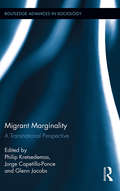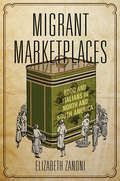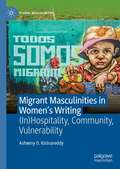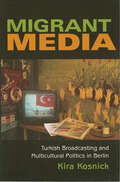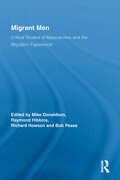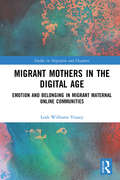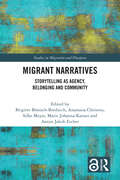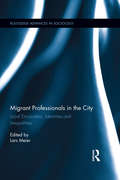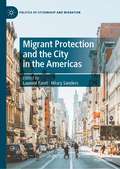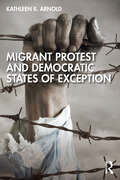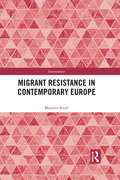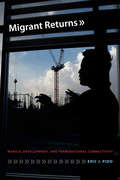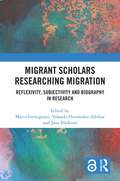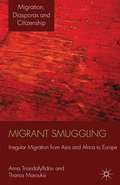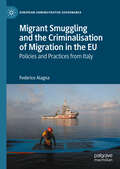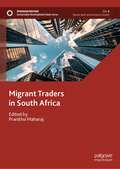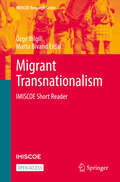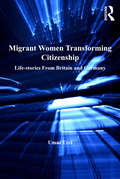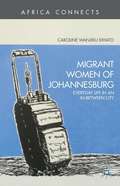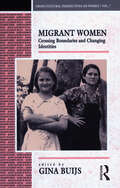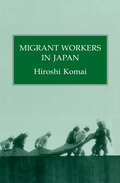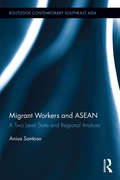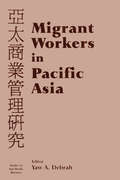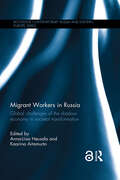- Table View
- List View
Migrant Marginality: A Transnational Perspective (Routledge Advances in Sociology #98)
by Philip Kretsedemas Glenn Jacobs Jorge Capetillo-PonceThis edited book uses migrant marginality to problematize several different aspects of global migration. It examines how many different societies have defined their national identities, cultural values and terms of political membership through (and in opposition to) constructions of migrants and migration. The book includes case studies from Western and Eastern Europe, North America and the Caribbean. It is organized into thematic sections that illustrate how different aspects of migrant marginality have unfolded across several national contexts. The first section of the book examines the limitations of multicultural policies that have been used to incorporate migrants into the host society. The second section examines anti-immigrant discourses and get-tough enforcement practices that are geared toward excluding and removing criminalized “aliens”. The third section examines some of the gendered dimensions of migrant marginality. The fourth section examines the way that racially marginalized populations have engaged the politics of immigration, constructing themselves as either migrants or natives. The book offers researchers, policy makers and students an appreciation for the various policy concerns, ethical dilemmas and political and cultural antagonisms that must be engaged in order to properly understand the problem of migrant marginality.
Migrant Marketplaces: Food and Italians in North and South America
by Elizabeth ZanoniItalian immigrants to the United States and Argentina hungered for the products of home. Merchants imported Italian cheese, wine, olive oil, and other commodities to meet the demand. The two sides met in migrant marketplaces--urban spaces that linked a mobile people with mobile goods in both real and imagined ways. Elizabeth Zanoni provides a cutting-edge comparative look at Italian people and products on the move between 1880 and 1940. Concentrating on foodstuffs--a trade dominated by Italian entrepreneurs in New York and Buenos Aires --Zanoni reveals how consumption of these increasingly global imports affected consumer habits and identities and sparked changing and competing connections between gender, nationality, and ethnicity. Women in particular--by tradition tasked with buying and preparing food--had complex interactions that influenced both global trade and their community economies. Zanoni conveys the complicated and often fraught values and meanings that surrounded food, meals, and shopping.
Migrant Masculinities in Women’s Writing: (In)Hospitality, Community, Vulnerability (Global Masculinities)
by Ashwiny O. KistnareddyThis book examines the representation of masculinities in contemporary texts written by women who have immigrated into France or Canada from a range of geographical spaces. Exploring works by Léonora Miano (Cameroon), Fatou Diome (Senegal), Assia Djebar, Malika Mokeddem (Algeria), Ananda Devi (Mauritius), Ying Chen (China) and Kim Thúy (Vietnam), this study charts the extent to which migration generates new ways of understanding and writing masculinities. It draws on diverse theoretical perspectives, including postcolonial theory, affect theory and critical race theory, while bringing visibility to the many women across various historical and geographical terrains who write about (im)migration and the impact on men, even as these women, too, acquire a different position in the new society.
Migrant Media: Turkish Broadcasting and Multicultural Politics in Berlin (New Anthropologies of Europe)
by Kira KosnickIn this innovative and thought-provoking study, Kira Kosnick explores the landscape of Turkish-language broadcasting in Berlin. From 24-hour radio broadcasting in Turkish to programming on Germany's national public broadcasting and local public access channels, Germany's largest immigrant minority has made its presence felt in German media. Satellite dishes have appeared in migrant neighborhoods all over the city, giving viewers access to Kurdish channels and broadcasts from Turkey. Kosnick draws on interviews with producers, her own participation in production work, and analysis of programs to elaborate a new approach to "migrant media" in relation to the larger cultural and political spaces through which immigrant life is imagined and created.
Migrant Men: Critical Studies of Masculinities and the Migration Experience (Routledge Research in Gender and Society)
by Richard Howson Bob Pease Mike Donaldson Raymond HibbinsThis edited volume contributes an important collection of chapters to the growing theoretical and empirical work being undertaken at the international level on men and migration. The chapters presented here focus on what we might call ‘migratory masculinities': the experiences men have of masculinity upon immigration into another national, ethnic, and cultural context. How do these men (re)construct their conceptions of masculinity? Where are the points of tension, ambivalence or assimilation in this process? Featuring interviews and data drawn from migrants working and living in Australia, this book explores how the gender identity of men from non-English-speaking backgrounds is influenced by the experiences of migration and settlement in an English-speaking culture, across various cultural spheres such as work, leisure, family life and religion.
Migrant Mothers in the Digital Age: Emotion and Belonging in Migrant Maternal Online Communities (Studies in Migration and Diaspora)
by Leah Williams VeazeyThis book explores the experiences of migrant mothers through the lens of the online communities they have created and participate in. Examining the ways in which migrant mothers build relationships with each other through these online communities and find ways to make a place for themselves and their families in a new country, it highlights the often overlooked labour that goes into sustaining these groups and facilitating these new relationships and spaces of trust. Through the concept of ‘digital community mothering,’ the author draws links to Black feminist scholarship that has shed light on the kinds of mothering that exist beyond the mother–child dyad. Providing new insights into the experiences of women who mother ‘away from home’ in this contemporary digital age, this volume explores the concepts of imagined maternal communities, personal maternal narratives, and migrant maternal imaginaries, highlighting the ways in which migrant mothers imagine themselves within local, national, and diasporic maternal communities. As such, it will appeal to scholars and students with interests in migration and diaspora studies, contemporary motherhood and the sociology of the family, and modern forms of online sociality.
Migrant Narratives: Storytelling as Agency, Belonging and Community (Studies in Migration and Diaspora)
by Anastasia Christou Silke Meyer Brigitte Bönisch-Brednich Marie Johanna Karner Jakob Escher, Jakob EscherWith a focus on migrant narratives, or the storytelling about migration, this volume considers the ways in which migration is and has been shaped by individual and collective experiences of agency, belonging and community. Driven by an agenda of deep listening, each chapter presents a narrative directly derived from qualitative research, an outline of the methodological framing as well as narrative analysis. Through close attention to the narrative, its performative aspects and its ruptures and silences, authors identify patterns and material in the fabric of such telling and retelling of stories that open up new perspectives on the migrant experience. This book develops a methodology of ‘dwelling with stories’ that allows for sustained and slow interrogation of the migrant experience and the accompanying decisions that shape narratives around mobility across borders. Its structure is innovative by emphasising the migrant voice and reflecting on the scholars’ positionality, while also offering new theoretical contributions that will advance the field of narrative analysis. The book will appeal to academics, students and practitioners in a wide range of subject areas within the humanities and social sciences, including anthropology, sociology, human geography, migration/refugee/diaspora studies and oral history.
Migrant Narratives: Storytelling as Agency, Belonging and Community (Studies in Migration and Diaspora)
by Anastasia Christou Silke Meyer Brigitte Bönisch-Brednich Marie Johanna Karner Jakob Escher, Jakob EscherWith a focus on migrant narratives, or the storytelling about migration, this volume considers the ways in which migration is and has been shaped by individual and collective experiences of agency, belonging and community.Driven by an agenda of deep listening, each chapter presents a narrative directly derived from qualitative research, an outline of the methodological framing as well as narrative analysis. Through close attention to the narrative, its performative aspects and its ruptures and silences, authors identify patterns and material in the fabric of such telling and retelling of stories that open up new perspectives on the migrant experience. This book develops a methodology of "dwelling with stories" that allows for sustained and slow interrogation of the migrant experience and the accompanying decisions that shape narratives around mobility across borders. Its structure is innovative by emphasising the migrant voice and reflecting on the scholars’ positionality, while also offering new theoretical contributions that will advance the field of narrative analysis.The book will appeal to academics, students and practitioners in a wide range of subject areas within the humanities and social sciences, including anthropology, sociology, human geography, migration/refugee/diaspora studies and oral history.Chapter 5, 6, 7 and 8 of this book are freely available as a downloadable Open Access PDF at http://www.taylorfrancis.com under a Creative Commons [Attribution-Non Commercial-No Derivatives (CC-BY-NC-ND)] 4.0 license.
Migrant Professionals in the City: Local Encounters, Identities and Inequalities (Routledge Advances in Sociology #130)
by Lars MeierThe migration of professionals is widely seen as a paradigmatic representation and a driver of globalization. The global elite of highly qualified migrants—managers and scientists, for example—are partly defined by their lives’ mobility. But their everyday lives are based and take place in specific cities. The contributors of this book analyze the relevance of locality for a mobile group and provide a new perspective on migrant professionals by considering the relevance of social identities for local encounters in socially unequal cities. Contributors explore shifting identities, senses of belonging, and spatial and social inequalities and encounters between migrant professionals and ‘Others’ within the cities. These qualitative studies widen the understanding of the importance of local aspects for the social identities of those who are in many aspects more privileged than others.
Migrant Protection and the City in the Americas (Politics of Citizenship and Migration)
by Laurent Faret Hilary SandersThis book aims to establish a dialogue around the various “urban sanctuary” policies and other formal or informal practices of hospitality toward migrants that have emerged or been strengthened in cities in the Americas in the last decade. The authors articulate local governance initiatives in migrant protection with a larger range of social and political actors and places them within a broader context of migrations in the Western Hemisphere (including case studies of Toronto, New York, Austin, Mexico City, and Lima, among others). The book analyzes in particular the limits of local efforts to protect migrants and to identify the latitude of action at the disposal of local actors. It examines the efforts of municipal governments and also considers the role taken by cities from a larger perspective, including the actions of immigrant rights associations, churches, NGOs, and other actors in protecting vulnerable migrants.
Migrant Protest and Democratic States of Exception
by Kathleen R. ArnoldRecognizing the radical disparity between migration/border policy and constitutional law "inside these borders," Kathleen R. Arnold focuses on two main forms of migrant protest to explore the meaning of resistance in a sovereign context: self-harming protest by detainees and faith-based sanctuary of individuals scheduled for detention. This activism creates a "democratic state of exception," interrupting the legal process, altering discretionary forms of sovereign power, and enacting rights not formally granted; these efforts go beyond the assertion of liberal rights or merely restoring the rule of law (even if these are goals), challenging the warfare state while constituting a demos that is formally illegible. Migrant Protest and Democratic States of Exception will be of interest to scholars, migrant advocacy professionals (including INGO and IGO officers), graduate students, and advanced undergraduate students in a variety of fields from legal studies to forced migration and refugee studies; political science, human rights, protest history and contemporary movements.
Migrant Resistance in Contemporary Europe (Interventions)
by Maurice StierlOver the past few years, increased ‘unauthorised’ migrations into the territories of Europe have resulted in one of the most severe crises in the history of the European Union. Stierl explores migration and border struggles in contemporary Europe and the ways in which they animate, problematise, and transform the region and its political formation. This volume follows public protests of migrant activists, less visible attempts of those on the move to ‘irregularly’ subvert borders, as well as new solidarities and communities that emerge in interwoven struggles for the freedom of movement. Stierl offers a conceptualisation of migrant resistances as forces of animation through which European forms of border governance can be productively explored. As catalysts that set socio-political processes into frictional motion, they are developed as modes of critical investigation, indeed, as method. By ethnographically following and being implicated in different migration struggles that contest the ways in which Europe decides over and enacts who does, and does not, belong, the author probes what they reveal about the condition of Europe in the contemporary moment. This work will be of great interest to students and scholars of Migration, Border, Security and Citizenship Studies, as well as the Political Sciences more generally.
Migrant Returns: Manila, Development, and Transnational Connectivity
by Eric J. PidoIn Migrant Returns Eric J. Pido examines the complicated relationship among the Philippine economy, Manila’s urban development, and balikbayans—Filipino migrants visiting or returning to their homeland—to reconceptualize migration as a process of connectivity. Focusing on the experiences of balikbayans returning to Manila from California, Pido shows how Philippine economic and labor policies have created an economy reliant upon property speculation, financial remittances, and the affective labor of Filipinos living abroad. As the initial generation of post-1965 Filipino migrants begin to age, they are encouraged to retire in their homeland through various state-sponsored incentives. Yet, once they arrive, balikbayans often find themselves in the paradoxical position of being neither foreign nor local. They must reconcile their memories of their Filipino upbringing with American conceptions of security, sociality, modernity, and class as their homecoming comes into collision with the Philippines’ deep economic and social inequality. Tracing the complexity of balikbayan migration, Pido shows that rather than being a unidirectional event marking the end of a journey, migration is a multidirectional and continuous process that results in ambivalence, anxiety, relief, and difficulty.
Migrant Scholars Researching Migration: Reflexivity, Subjectivity and Biography in Research
by Marco Gemignani Yolanda Hernández-Albújar Jana SládkováHow can biography and reflexivity become integral processes of an inquiry? How do we apply these processes to our research and to our accounts of ourselves? Presenting studies by migration scholars who are migrants themselves, Migrant Scholars Researching Migration illustrates the creative and affective function of embedding one's research in subjectivity, reflexivity, and personal biography. The book shows that linking personal experiences and biographies with research practices and agendas can be instrumental to the development of knowledges and new methodologies. The authors demonstrate, for instance, how their migration backgrounds have affected what kind of research they ‘should’ conduct. They also describe how their research findings have changed their understanding of their personal positionings as migrants and scholars. This book debunks the dogma of separating the researcher from their investigation by placing the researchers' experiences and multi-layered reflections at the center of their scholarly work. It sheds light on the importance of reflexivity and subjectivity as processes and assets in research rather than obstacles. Migrant Scholars Researching Migration will appeal to researchers and students interested in methodology, biographical research, theories of knowledge, and scholars of migration and diaspora studies. Chapters: Chapter 14 of this book is freely available as a downloadable Open Access PDF at http://www.taylorfrancis.com under a Creative Commons [Attribution-Non Commercial-No Derivatives (CC-BY-NC-ND)] 4.0 license.
Migrant Smuggling
by Anna Triandafyllidou Thanos MaroukisThis book explores the phenomenon of irregular migration, notably the organization and role of migrant smuggling networks in aiding irregular migration from Asia and Africa to Europe. It also discusses how migration control policies in southern European countries shape the migrant smuggling phenomenon and the smuggling 'business'.
Migrant Smuggling and the Criminalisation of Migration in the EU: Policies and Practices from Italy (European Administrative Governance)
by Federico AlagnaThis book examines migrant smuggling and migration governance in the European Union. Following the 'refugee crisis' of 2014-15 and the rise in the number of people crossing the Mediterranean Sea, growing concern has been expressed in the media and elsewhere as to how EU institutions have tackled migrant smuggling. Focusing particularly on Italy during the period of the Eighth European Parliament (2014-19), the book assesses the evolution of anti-smuggling policies at EU and national level, and considers why institutions and policy-makers have failed to fully address the issue. Adopting a bottom-up approach, it also analyses the roles that people on the move, smugglers, law enforcers, the judiciary and border guards play in influencing policy processes. With political and public debates over migration more vociferous than ever, the book provides important insights into the EU approach to migrant smuggling. It will appeal to all those interested in public policy, migration studies, European politics and criminology.
Migrant Traders in South Africa (Sustainable Development Goals Series)
by Pranitha MaharajThis edited book examines the social realities of migrant traders in the informal economy in South Africa. It draws on original research conducted with migrant traders in order to understand their lived experiences in light of the COVID-19 pandemic. With chapters on the diverse types of informal trading, urban versus rural settings, migrant women, xenophobia, crime, poverty, well-being and policy responses, the book will be a valuable resource for researchers, scholars, policymakers and development practitioners whose work relates to SDG 8 (Decent Work and Economic Growth).
Migrant Transnationalism: IMISCOE Short Reader (IMISCOE Research Series)
by Marta Bivand Erdal Özge BilgiliThis open access short reader provides a compelling introduction to research on migrant transnationalism. The short reader focuses on the significant area of remittances (in financial terms). However, attention is also paid to political, social, cultural and religious transfers and exchanges – underscoring the salience of the wide range of ties that are maintained across borders. Increasingly such ties are sustained through virtual and technology facilitated modes of interaction. Drawing on established and recent empirical research from across the globe, in dialogue with scholars of migrant transnationalism, the book offers an overview of approaches, conceptual tools, thematic areas, and methods of investigation. Thus, this short reader sheds light on the fundamentals of existing knowledge on migrant transnationalism: What are the key questions in migrant transnationalism research today? How does a transnational perspective deepen our understanding of migration, (social) mobility, diversity, inclusion and development? As a source for researchers, students and policy makers, this short reader is essential reading which shows why looking at the world through a transnational lens adds value, for anyone interested in migration and social change.
Migrant Women Transforming Citizenship: Life-stories From Britain and Germany (Studies in Migration and Diaspora)
by Umut ErelMigrant Women Transforming Citizenship develops essential insights concerning the notion of transnational citizenship by means of the life stories of skilled and educated migrant women from Turkey in Germany and Britain. It interweaves and develops theories of citizenship, identity and culture with the lived experiences of an immigrant group that has so far received insufficient attention. By focusing on the British and German contexts, it introduces a much needed European and comparative perspective, whilst exploring the ways in which diverging concepts and policies of citizenship allow for a differentiated examination of ethnicity, gender, multiculturalism and citizenship in Europe. Presenting a significant and welcome contribution to our understanding of the complexities of multiculturalism it challenges Orientalist images of women as backward and oppressed. Through engagement with the changing realities of education, work, intimacy, family and social activism, this volume provides a situated account of how the concepts of citizenship, transnationality and culture play out in actual social relations. With its rich empirical material the book explores how migrant women create new practices and meanings of belonging across boundaries. Critiquing dominant multiculturalist and anti-multiculturalist accounts, this book suggests how citizenship debates can be reframed to be inclusive of migrant women as actors. As such it will appeal to those working across a range of social sciences, including sociology and the sociology of work, race and ethnicity; citizenship, cultural and gender studies, as well as anthropology and social and public policy.
Migrant Women of Johannesburg
by Caroline Wanjiku KihatoThrough rich stories of African migrant women in Johannesburg, this book explores the experience of living between geographies. Author Caroline Kihato draws on fieldwork and analysis to examine the everyday lives of those inhabiting a fluid location between multiple worlds, suspended between their original home and an imagined future elsewhere.
Migrant Women: Crossing Boundaries and Changing Identities (Cross-Cultural Perspectives on Women)
by Gina BuijsPopulation movements on a large scale have been a prominent feature of modern society, but there have been as yet few attempts to look beneath the surface of mass movements of people. There is a particularly urgent need to disentangle the specific experience of women who are critically involved in the process of adaptation to new worlds and ways of life. Most of the women studied in this volume hoped to retain their original culture and lifestyle at least to some extent but found that the exigencies of being migrants and refugees forced them to examine their preconceptions and to adopt roles, both social and economic, which they would have rejected at home. This remaking of self was often a traumatic experience with serious repercussions on their relationships with their menfolk. On the other hand, for some women, emigration also provided a spur to ambition and progress, a means of achieving a social and economic mobility that they would have been denied at home.
Migrant Workers In Japan
by KomaiFirst Published in 1995. Routledge is an imprint of Taylor & Francis, an informa company.
Migrant Workers and ASEAN: A Two Level State and Regional Analysis (Routledge Contemporary Southeast Asia Series)
by Anisa SantosoASEAN (The Association of Southeast Asian Nations) has made slow progress in defining a regional policy for the protection of migrant workers. This book examines the normative structures within the institutions at play at both state and regional level of ASEAN, which influence the making of a migrant workers' protection policy.The author puts forward a novel alternative policy analysis tool – the Two Level State and Regional Analysis – that enables satisfactory explanation for policy-making cases, whereby normative institutional structures are involved and social policies are considered. The author argues that the formulation of a working coherent migrant workers protection policy has not been achieved because of the presence of normative institutional structures with ideas unsupportive to the protection of migrant workers, which results in a slow institutionalisation process. Although the migrant workers in question are their citizens, and migrant sending countries are supposed to have more supportive normative structures for workers protection, the author finds that when examined closesly, institutions in both migrant sending and receiving countries tend to have normative structures that are against workers protection. These arguments drive the analytical questions of the book to inquire about the forms of the normative structures involved and their influence in the relevant institutions. A unique contribution to the study of ASEAN and migration in Southeast Asia, this book will be of interest to academics in the field of Social Policy, Migration Studies and Asian Studies, in particular Southeast Asian Studies.
Migrant Workers in Pacific Asia
by Yaw A. DebrahThe migration of workers to the high growth countries in Pacific Asia in the 1980s was a new phenomenon in these countries. As such the host governments did not have in place adequate housing, social security and legal protection, but the tight controls following the financial crisis have pushed these issues to the back burner.This volume discusses the debates and controversies surrounding this issue in Malaysia, Taiwan, SIngapore, South Korea, Japan and China.
Migrant Workers in Russia: Global Challenges of the Shadow Economy in Societal Transformation (Routledge Contemporary Russia and Eastern Europe Series)
by Kaarina Aitamurto Anna-Liisa HeusalaRussia has a very large pool of economic migrants, up to 25% of the workforce according to some estimates. Although many migrants, many from former Soviet countries which are now independent, entered Russia legally, they frequently face bureaucratic obstacles to legal employment and Russian citizenship, factors which have led to a very large “shadow economy”. This book presents a comprehensive examination of migrant labour in Russia. It describes the nature of migrant labour, explores the shadow economy and its unfortunate consequences, and discusses the rise of popular sentiment against migrants and the likely impact. The book also sets the Russian experiences of migrant labour in context, comparing the situation in Russia with that in other countries with significant migrant labour workforces.
